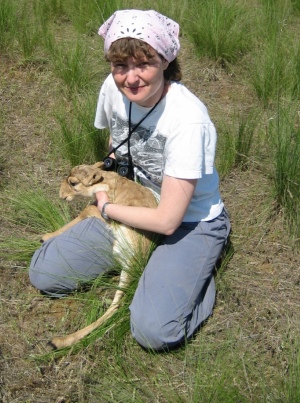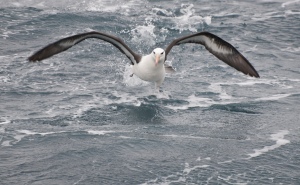Conservationist aims to help seabirds and sea turtles with new fellowship

An Imperial scientist has received a prestigious fellowship to reduce the number of marine species being harmed accidentally by commercial fishing.

Professor Milner-Gulland has previously been involved with projects to conserve animals including rhinos and antelopes.
EJ Milner-Gulland, Professor of Conservation Science in the Department of Life Sciences, will undertake a three-year, 150,000 USD project designed to reduce bycatch; the incidental taking of fish and other marine species by commercial fisheries. She is one of five scientists from around the world to be awarded a 2015 Pew Marine Fellowship, announced this week by the Pew Foundation.
Although the fishing industry has made great strides in reducing bycatch through the use of simple technologies such as turtle excluders, many animals such as sharks, rays, seabirds and sea turtles remain at risk. To address this issue, Professor Milner-Gulland is planning to develop ways to reduce bycatch by working with communities that are involved with fishing.
There are already many technologies that can minimise bycatch, such as a curtain of streamers called a Tori line, which can be used behind a fishing boat to scare away birds and which can reduce albatross mortality by up to 90 percent. However, in order for such measures to work they have to be used by those carrying out the fishing.

Albatrosses can be caught during fishing for sharks and swordfish
Professor Milner-Gulland explained: “Technologies like Tori lines are simple and effective but not all fishers are using them. The kind of conservation work that we do is partly about talking to the fishers to understand why that is, and exploring with them what might motivate them to use the different technologies that are out there. Fishers don’t want bycatch - it interferes with the work that they’re trying to do - so our work can help them to find ways to get around it, to everyone’s benefit. Bycatch is a massive issue and it really does damage charismatic species, but we believe fisheries can be part of the solution rather than the problem.”
During her fellowship, Professor Milner-Gulland will be focusing on ways of protecting animals including oceanic whitetip sharks, which can be caught in longline fishing for tuna; albatrosses and petrels, which can be caught during longline fishing for sharks and swordfish in Brazil; and turtles caught during fishing in the Eastern Pacific.
Professor Milner-Gulland has previously been involved with projects that have connected with local communities in order to help conserve animals including elephants, rhinos, and antelopes, under threat from the international trade in wildlife products. She will be applying some of the conservation ideas and approaches developed in these terrestrial projects during her fellowship in marine conservation.
Article text (excluding photos or graphics) © Imperial College London.
Photos and graphics subject to third party copyright used with permission or © Imperial College London.
Reporter
Laura Gallagher
Communications Division